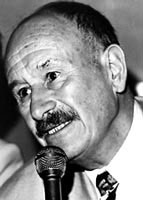Stay true to your words
Advertising slogans can change perceptions when they incorporate a branding message, others simply blend into the background

‘The slogan is dead.’ Or so I was told by someone doing the job I used to do. I am wary of such pronouncements. In the past decade I have been appraised of the demise of advertising copy, jingles, print. Reports of the slogan’s death, as Mark Twain would say, and www.adslogans.co.uk confirm, are greatly exaggerated.
A slogan needs to be short, simple, distinctive and identifiable. An art director colleague described what it should be like: ‘not a highly polished pebble but a burr’. Clinging to our person should be a thought, an image, a flash of wit or a relevant pun. The sloganeer uses various devices: rhyme, rhythm, alliteration, assonance. These help to fix the phrase in the memory and, ideally, lock in the brand name. One simple way to do this is to incorporate the brand name within the slogan. This, however, is too obvious for some of the sophisticates.
An ad should pass a two-way identity test: describe it to friends and see if they can name the brand; and mention the name to other friends and see if they can describe the ad. Some memorable ads do not score well. For example, the Joan Collins/ Leonard Rossiter campaign for… Martini? Cinzano?; and the line that went into the language ‘I’m only here for the beer’. But which beer? It was Double Diamond – in the 1970s. In previous years they used the line ‘A Double Diamond works wonders’ sung to the tune of ‘There’s a hole in my bucket’. Old-fashioned? Yes. But one thing old-fashioned advertisers did was brand.
• That’s Shell that was!
• Player’s Please
• My goodness! My Guinness!
• Did you Maclean your teeth today?
• Beans means Heinz
• Murray Mints – too-good-to-hurry mints.
Asking a friend which brand any of those is advertising is akin to asking who wrote Beethoven’s Fifth.
Most of today’s slogans seem shy, retiring things, polite and apologetic. Do you know to which brands these current lines belong? (Answers below)
a) Because life doesn’t stop
b) Keep your’s busy
c) Fun anyone?
d) How are you?
e) Shift expectations
f) The pursuit of dreams.
Compare those with their contemporaries: ‘For everything else there’s Mastercard’, ‘My mate Marmite’ (as in-your-face as ‘You’ve been Tangoed’) and ‘Intel Inside’. Intel also registers the name musically with what is today termed a ‘sonic brand trigger’ (or a very short jingle). The Danone two-note sign-off is another example.
One brand that never lets you forget its name is Skoda. Before 1999 what people could not forget was its image. The marque was the butt of jokes. ‘Fiat and Skoda are working together on a new car. It’s called the Fiasko.’ But in the real world the partner is Volkswagen, which knows a thing or two about changing perceptions. Skoda originally had a good name: VW aimed to restore it.
If only the burghers of Bolton would do the same. There is a move to rebrand the town Bolton le Moors. A brand or locality can change significantly without changing its name. Tesco has changed. Islington has changed. Peckham is transforming itself. No question there of a bolt-on solution.
The Skoda turnaround is happening apace. The company and its UK agency Fallon grasped the nettle of perception and made of it a virtue. They confronted the public with the facts, showed the car and said, ‘It’s a Skoda. Honest.’ The slogan can work even when the turnaround is complete and the name is no longer a problem, conveying not surprise, but reassurance of build quality.
Interestingly, the parent company is not known for slogans. Though the classic Beetle headlines – ‘Think small’, ‘Lemon’, ‘Mass Transit’ and so on – short, sharp, cutting, were sloganesque, VW eschewed the use of a conventional summing-up of the brand’s promise in each ad. Yet each ad was branded by the tone of voice, the philosophy, the look. Branding was designed in. Similarly, the brand must be designed into the slogan. Check the origin of the word in the dictionary. Slogan is Scottish – ‘a clan war-cry’. Not, you note, anybody’s war-cry.
Answers: a) Lemsip Max; b) Virgin Mobile; c) PlayStation; d) Vodafone; e) Nissan; f) HondaPlease e-mail comments for publication in the Letters section to lyndark@centaur.co.uk
-
Post a comment



